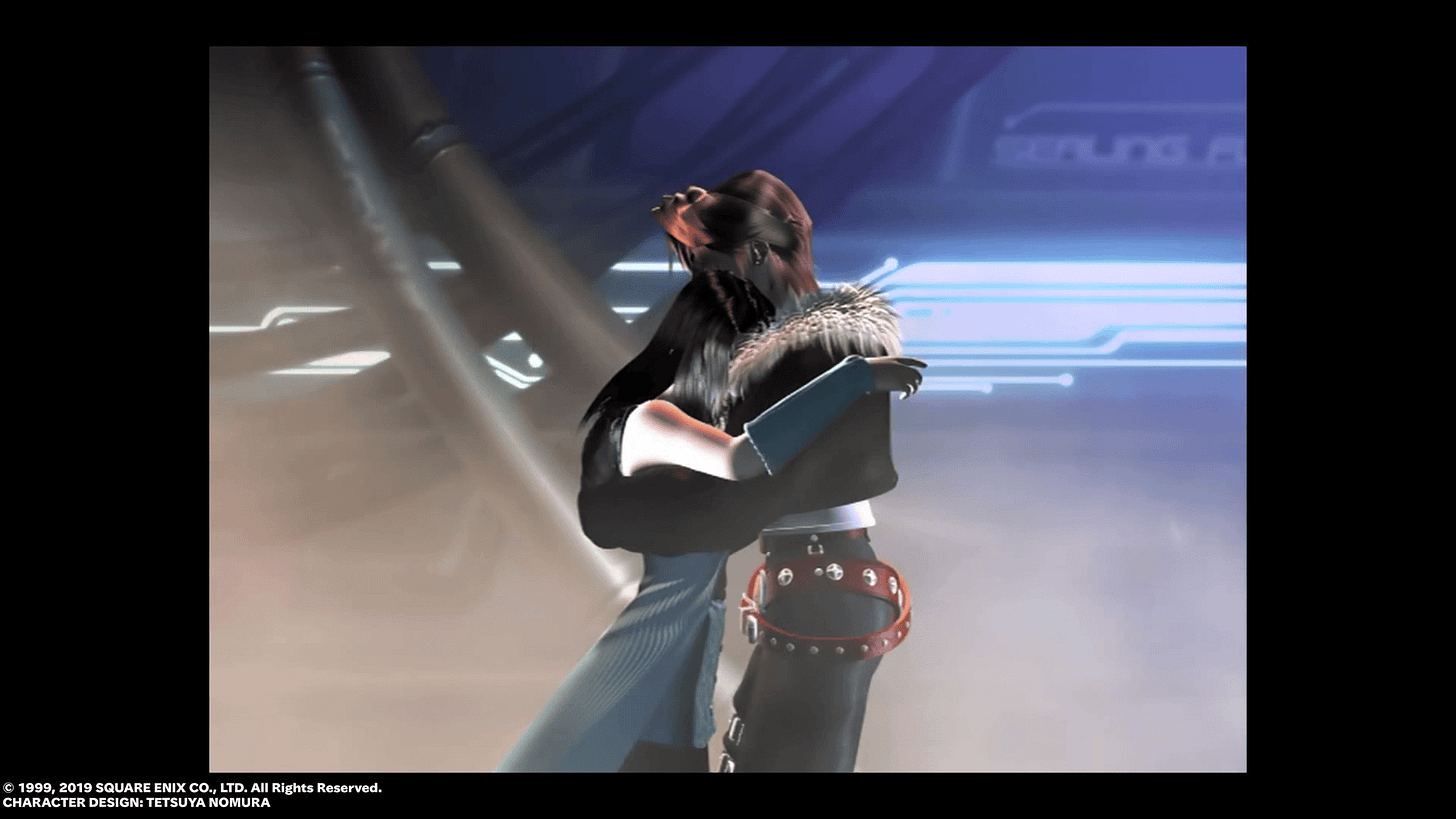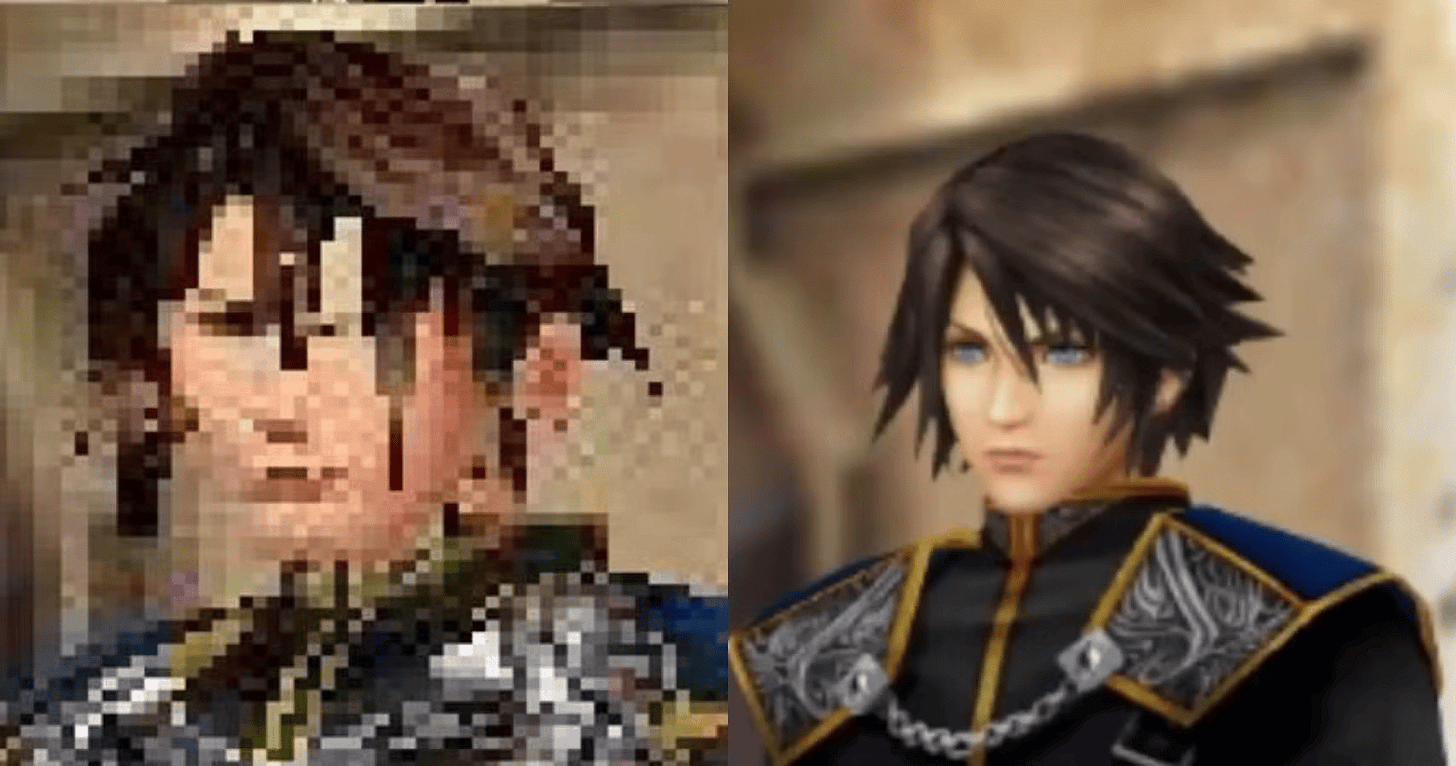Game Club is where I review a game on my backlog with the intention of creating a conversation about said game. This is the first game on the list - feel free to leave your thoughts!
9/9/99 - This date was a very important date for Gaming - not only did Final Fantasy VIII come out on this date, earning a Critical Hit - but the Sega Dreamcast also came out at this time in North America. While I was swept up in the fanfare of a new Final Fantasy coming out (as I had just beaten Final Fantasy VII not too long before this release), I remember getting a demo disc of Final Fantasy VIII and not being super impressed. From then on, I'd have a ...well hate relationship with Final Fantasy VIII. My stepbrother would play Final Fantasy VIII and would swear that it's one of the great Final Fantasy's of the time, but I just couldn't see it. I tried off and on to play Final Fantasy VIII but could never really be drawn into it at all. Enter 2024.
For a long time, I did not like Final Fantasy VIII. I thought it was weird with its obtuse design and the way that it had you upgrade your equipment instead of just buying it out right was beyond my comprehension at the time. The Junction system felt like an enormous oversight and miss in a series that rarely had misses like these. Triple Triad, while fun, also seemed like it was imperative to even do anything in the game. I just couldn't wrap my head around the game and it's systems until I decided to play the other games with the recent Pixel Remasters and as a result it helped me really understand the Final Fantasy series as a whole. I actually set forth to beat each Final Fantasy until I had them all under my belt. I got through the entire Pixel Remaster series. I then played Final Fantasy VII Rebirth (which I hold in very high regard) and it really got me looking at how Final Fantasy has tried to consistently turn RPG mechanics on it's head time and time again. While some Final Fantasy games play it a bit safer than others - it's the weird experiments that stuck out to me the most. Final Fantasy II for example with its unique character growth system that many didn't like at the time (and even in current day to some extent) would eventually birth the entire SaGa game series. A sister series to Final Fantasy that I really enjoy as much as Final Fantasy itself in some cases - was never shy to experiment with RPGs either. After playing through these six initial Final Fantasy's it became clear that Final Fantasy VIII wasn't as far removed from its predecessors as I thought. It definitely felt in line with the type of experimentation that they would do over the years to try and push the RPG wheel forward - in comparison, Final Fantasy IX that came after felt more of a safer entry than VIII, and while I adored that game way more than VIII at the time - it's one I rarely go back to due to the length of that adventure. With my eyes opened to the fact that Final Fantasy VIII isn't really such a crazy experiment but more in line with the history of Final Fantasy VIII (and also thanks to Andrew Bluett's recent retrospective).
I decided to take another crack at the game to see if I can't gather any new insights.
To start, I played the Final Fantasy VIII Remaster that was released not too long ago - using the 3X speed is a godsend as FFVIII can move SLOW at times. Especially when drawing magic from enemies, but more on that a little later. The brief intro is that you play as Squall Leonhart - a member of SeeD which was developed as a group of mercenaries - to what end...well you gotta find that out. The game starts off strong with a crazy opening that feels cinematic. You could tell Square was trying their best to bridge the gap between gaming and movies at this time - and while I think they more or less succeeded - the technology just held them back at the time, as if you look at recent entries in Final Fantasy, it's almost effortless how they are able to bridge that gap these days. The gameplay is typical turn based Final Fantasy but with some key differences. Instead of having your normal Attack -> Magic -> Item commands, you can also learn other helpful commands from what's known as Guardian Forces or "GF". These Guardian Forces serve a similar purpose to summons in past games but you also learn new abilities from them as well. For example, you can learn the Treatment command which immediately heals status effects from your character. There's also the ability to create magic from items you find around as you play. Another command is the DRAW command. This allows you to draw magic from any enemy you fight (and it's how you unlock some GFs during boss battles) and Magic is incredibly important beyond just casting this time around. You can do something called Junction which allows you to essentially "equip" your magic to various stats. This powers those stats based on the type of magic and the number of magic stock you have. Luckily, Square decided in their infinite wisdom to have a specific icon to indicate what magics are currently junctioned to you (it doesn't tell you the specific stat but just knowing it's Junctioned is usually enough). Some GFs actually allow you to expand the stats available to Junction once learned so you can really build a character the way you want. There's also ways to junction to your attack and defense (so you can junction Fire to deal more fire damage, or junction Sleep to be more resistant to Sleep.)
Now when I originally played this game all those years ago, I really didn't understand how all these different gameplay mechanics came together to create something unique and...good. As I've played through this game this time however, I found that a lot of the gameplay mechanics that were tough to understand, suddenly made a lot more sense when you see it through the lens of how the game is supposed to operate. On top of that, this game is probably one of the easiest Final Fantasy games to break - in fact with enough preparation you can find yourself with the best weapons in the game as early as Disc 1. I chose not to go this route and play the game somewhat traditionally minus the boosts you can get from the Remaster - which even with the boosts a lot of the game is still challenging at times. Going back to the speed boost mentioned earlier - a lot of times without this boost the game moves at a snails pace. Whenever I turn the speed boost off, I'm amazed at how much slower the game plays. This could be due to abusing the speed boost and the normal speed feels way slower in comparison but even attacking and moving are slow. Also, as mentioned previously trying to get 99 stock of a magic through drawing would normally take forever as well but this substantially cuts that down to a more manageable level.
Overall, while this definitely isn't my favorite Final Fantasy of all time - it has definitely climbed the ranks a bit for me. Taking a tenth look at this game really did wonders, as I've had so much more fun this time around than in the past. I'm not sure if it's due to the fact that my appreciation for game mechanics has improved over time or what the case maybe, but I'll say if you haven't played it in awhile, try the Remaster out and see if the boosts help you appreciate the game more like it helped me out.







